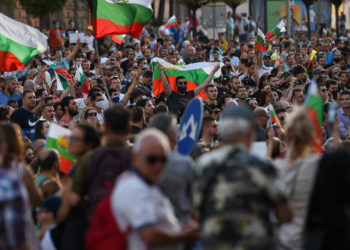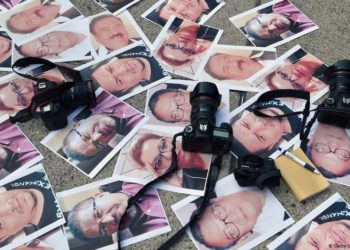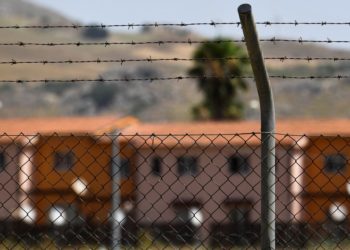Corruption-plagued E.U. member Bulgaria found itself under pressure Monday to find the killer of a television journalist whose brutal murder at the weekend has shocked the country and sparked international condemnation.
The body of 30-year-old Viktoria Marinova — who presented a current affairs talk programme called “Detector” for the small private TVN television in the northern town of Ruse — was found on Saturday.
“All leads are being looked at” in the crime investigation including possible links to her professional activity, chief prosecutor Sotir Tsatsarov said Monday.
Authorities earlier revealed that Marinova had been killed by blows to the head and from suffocation, and had also been raped.
“We are in shock. In no way, under any form, never have we received any threats — aimed at her or the television,” a journalist from Marinova’s own TVN told AFP under the condition of anonymity Sunday, adding that he and his colleagues feared for their safety.
Marinova is the third journalist to be murdered in Europe this year after Jan Kuciak in Slovakia in February and Daphne Caruana Galizia in Malta in October 2017.
Bulgaria is regarded as one of the tail-lights in the E.U. in matters of press freedom, ranking 111th out of a total 180 in this area, according to the NGO, Reporters Without Borders (RSF).
“Shocked by the horrendous murder of Victoria Marinova. Again a courageous journalist falls in the fight for truth and against corruption,” the E.U. Commission’s vice president Frans Timmermans tweeted late Sunday.
“Those responsible should be brought to justice immediately by the Bulgarian authorities.”
CPJ calls on the Bulgarian authorities to conduct a rigorous, thorough investigation into the killing of Victoria Marinova, presenter and administrative director for local television channel TVN. #Bulgaria https://t.co/gc6xjyw19a
— Committee to Protect Journalists (@pressfreedom) October 7, 2018
‘A Warning’?
Condolences poured in on social media for Marinova who leaves behind a small child. A candlelight vigil in her memory will be held on Monday evening in both Ruse and the capital Sofia.
Some observers believe there could be a link between the murder and Marinova’s work.
The first episode of her programme, aired on September 30, featured an investigation into alleged fraud involving E.U. funds linked to oligarchs and politicians.
She had interviewed the reporters behind the story, investigative journalists Dimitar Stoyanov from the Bivol.bg website and Attila Biro from the Romanian Rise Project.
Bivol.bg owner Asen Yordanov told AFP that “Viktoria’s death, the brutal manner in which she was killed, is an execution. It was meant to serve as an example, something like a warning.”
The crime has sparked international outcry, with the OSCE’s media freedom representative, Harlem Desir, calling for “a full and thorough investigation”.
“Those responsible must be held to account,” he said Sunday.
The Committee to Protect Journalists similarly demanded that Bulgarian authorities “employ all efforts and resources to carry out an exhaustive inquiry and bring to justice those responsible.”
In Bulgaria, however, the national TV networks only dedicated a few minutes of airtime to the case.
And even some of Marinova’s fellow journalists were not convinced that she was killed because of her reporting.
“The country has a bad image with regard to press freedom, but it’s possible that there is no link to this case,” said Svetoslav Terziev, opposition media analyst who also teaches journalism.
“She wasn’t a typical investigative journalist. Her new programme doesn’t seem to offer any motive to kill her,” said Tihomir Bezlov, of the Center for the Study of Democracy (CSD) in Sofia.
Reporting Obstacles
Widespread corruption, shady media ownership and suspected collusion between journalists, politicians, and oligarchs have made objective reporting a constant obstacle course, according to RSF.
According to the Bulgaria-based Association of European Journalists, reporters from small regional and local media are particularly subjected to pressure from local businessmen and politicians and outright threats, often leading to self-censorship.
Violence against women has also been widespread in Bulgaria, with a number of brutal killings of women by their ex-boyfriends and ex-husbands causing an outcry in the media recently.
There is no democracy without a free press.
It is with great sadness that we learned about the murder of the Bulgarian journalist Viktoria Marinova. Our thoughts are with her family and friends.
We expect a swift and thorough investigation to bring those responsible to justice. pic.twitter.com/OcyPR9fQ4p— European Commission (@EU_Commission) October 8, 2018
























